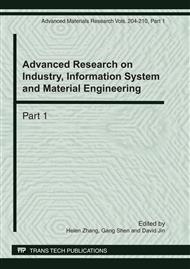p.784
p.788
p.792
p.796
p.802
p.806
p.810
p.814
p.818
An Empirical Study on the Internet Writing Behaviors in Chinese Context
Abstract:
The purpose of this paper is to explore the writing behaviors of Internet literature in Chinese environment, aiming to understand the basic personal characters, writing motivations and behaviors of Internet writers. Through both qualitative and quantitative researches, the study found a high consistency of personal characters within Internet writers. As the writing motivations of them, the statement that “writing is just the purpose itself” is the most popular. Meanwhile, most of Internet writers like to interact with other writers or readers. With the interaction, they revise their own writing topics and styles, which proves the Internet writing behaviors are not one-way communications, but part of a social exchanging processes.
Info:
Periodical:
Pages:
802-805
Citation:
Online since:
February 2011
Authors:
Price:
Сopyright:
© 2011 Trans Tech Publications Ltd. All Rights Reserved
Share:
Citation:


